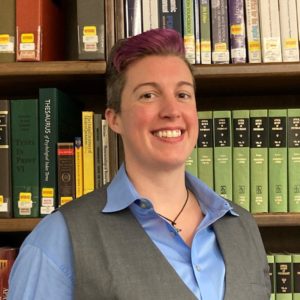Dr. River Farrell is a adjunct faculty member teaching a section of Professional & Scientific Ethics in the MA program this semester.
Where did you grow up? 
I grew up in a small town in upstate NY from the time I was two until the middle of my junior year in high school when we moved to NC.
What or who influenced you to study psychology?
I have known I wanted to study psychology since I was in seventh grade. We did a project that involved researching a career that we might want to have. As someone who has always been the one to whom their friends turned for support, I wanted to know how to do that better. I wanted to understand people so that I could help them.
Honestly, as a 12-year-old, I was probably looking to have some control over the situation that I found myself in. My friends were suffering from everything from domestic violence, and parents with alcohol addition to sexual assault and difficulties associated with living in poverty. While it is cliche to say that I have always wanted to help people, for me it is my truth. I could not stand by, knowing these things were happening and do nothing.
What are your research and/or clinical interests?
The experiences that led me to psychology in the first place have continued to influence my career trajectory. I continue to fight for those who have less power and privilege. I specialize in working with the gender and sexual minority community who often face (or have faced) many of the same traumas I witnessed growing up. It is my honor to be able to continue to help. Additionally, I am one of only a handful of clinicians who see transgender and gender non-conforming youth in southeast Michigan.
In terms of research, I have a special interest in both gender and sexual minorities as well as issues around consensual non-monogamy. Utilizing an acceptance and commitment therapy framework in my clinical practice I hope to start doing more in terms of research within this community in the near future.
What appeals to you most about teaching at MSP?
First, I am very passionate about teaching. I started studying psychology in order to help people. I have found that I am only one person and as such I am only able to see so many clients. At this point in my life and career I want to help others become the best clinicians they can be so that I might in some small way help even more people. I have found that everyone at MSP shares my passion for helping students become the best clinicians possible. The emphasis on trauma, diversity, and inclusion within the program feels welcoming and I am so glad to be part of that.
What is your favorite non-academic book and why?
While I haven’t read for pleasure in ages, I most enjoy fantasy novels. Book series gives ample opportunity for character development and in fantasy there is usually some kind of “bad buy” that can be fought and overcome. Unlike reality where so many problems that our clients and society face there is usually a decisive course of action and a way to solve the problems.
What advice would you like to share with incoming or current students?
Find your specialty, worry less about being able to treat everyone and more about being able to be the best you can be at helping a specific struggle or population. Not only will this allow you more focus and depth of knowledge it will also become a source of referrals as you become known for your work. You do not have to be able to treat everyone. No one can be the best at everything.